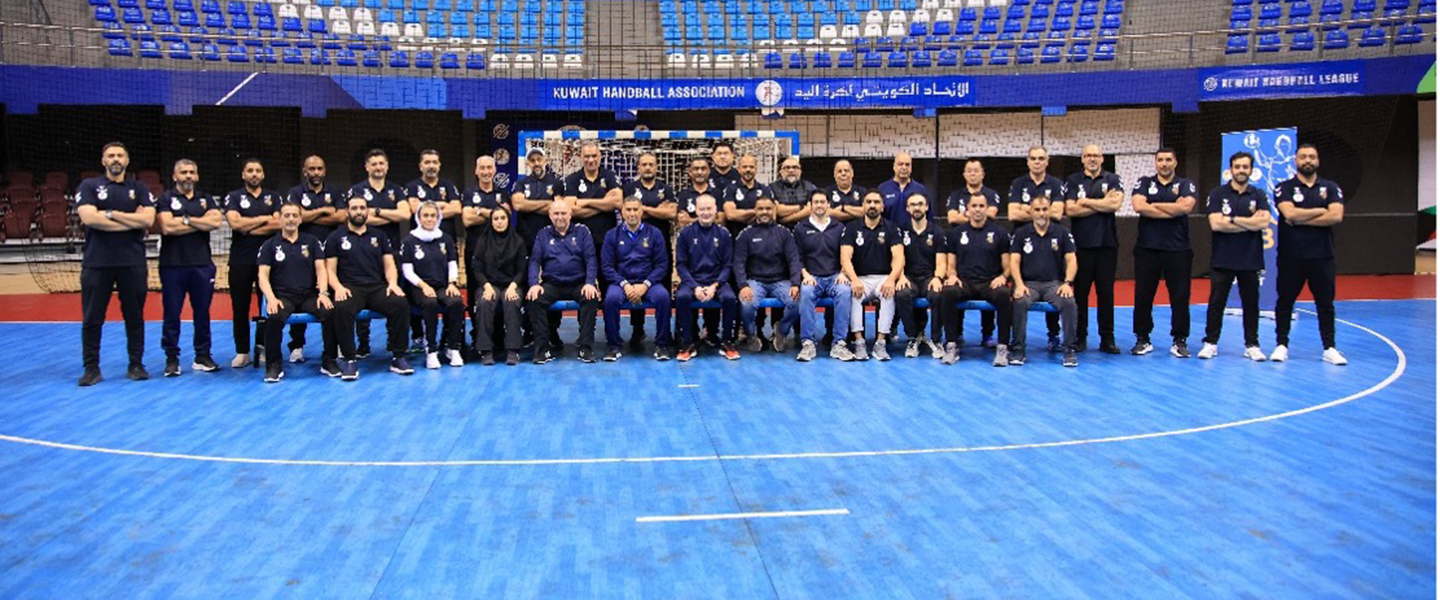31 coaches attend first B-licence course for the Asian Handball Federation in Kuwait
04 Mar. 2025

The implementation of the IHF Coaches Licence Structure, especially in the continental associations outside of Europe, has been a clear focus within the IHF Commission of Coaching and Methods (CCM) since 2023.
The aim of this development strategy is to build a systematic and long-term structure for the coaches’ education with the IHF member countries.
At the same time, the "IHF Multipliers" project, in which coaches are specifically identified and trained in the continental associations, to take over and lead coach training in their national member associations in the medium term, is still a big focus.
As part of a "two-year transition period", coaches with particularly long-standing experience can obtain the relevant license training faster, as part of license courses with adapted content.
In close cooperation between the IHF and CAHB, the transition period for the African continental association was successfully carried out in 2023 and 2024. Over 1,500 coaches received a coaching license (D, C, B and A licenses). In 2024, the CAHB Men’s African Championship was the first continental competition in Africa which had a mandatory requirement for participating teams to have a coach with an A-licence on the bench.
B-licence course brings 31 experienced coaches in Kuwait
Between 16 and 23 February 2025, the first B-licence course for the Asian Handball Federation (AHF) was held in Kuwait as part of a two-year transition period (2025 and 2026). 31 experienced coaches from nine countries took part in this course, which was organized under the leadership of the IHF and AHF, in cooperation with the Kuwait Handball Association.
In addition to content-related focal points such as evolution of the game, development trends in attack and defence, mental training, group dynamics and team cohesion, the focus in theory and practice was primarily on the "coaching tools" for leading and conducting training sessions.
Each participant presented a tactical topic (attack or defence), featuring the Kuwait youth national team. The participants received specific feedback on their choice of training content, the methodological approach chosen, the targeted correction of the players and their overall training organization and intensity.
In addition, each trainer presented their personal "team project", featuring a presentation and selected video scenes from their training work.
Overall, the B-licence training is clearly interactive in terms of the choice of teaching methods. Many topics are dealt with in a practical way in group work with the help of various video materials. The participants can thus bring their own extensive experience and skills directly into the course, enabling a targeted exchange of experiences and opinions.
Another important guiding principle in the course was the question of how Asian handball can be developed in the long-term. References were repeatedly made to the game philosophy (especially the defensive style of play), to talent promotion and the content orientation in the development of youth players. In addition, aspects of a modern trainer profile in handball were also discussed.
At the end, 4 coaches were selected who had demonstrated the best practical training units:
- Ahmad Ghaloum - Kuwait
- Mohammed AbdulNabi Ali - Bahrain
- Hassan Ranjkar Irani - Islamic Republic of Iran
- Matin Najd Samiei - Islamic Republic o Iran
Overall, the B-licence course, which was excellently prepared by the organizers, was a first big step in the implementation of the IHF Coaches License structure in the AHF. Another B-licence course for the AHF will follow in August 2025, which will be hosted by the Japanese Handball Association in Tokyo.

